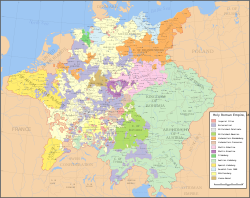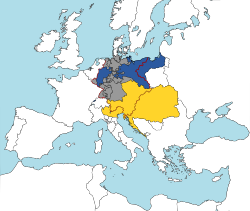Germans
Germans (German: [Deutsche] Error: {{Lang}}: text has italic markup (help)) are the people of Germany. There are two main groups of people who are called Germans. They are citizens of Germany and ethnic Germans. They are also called German people.
| Regions with significant populations | |
|---|---|
| 72,650,269 | |
Citizens of Germany
The term German is used to describe a person who is a citizen of the country. This is true no matter what their ethnicity. As long as they meet the requirements of German laws to be a citizen of Germany, they are Germans.
Ethnic Germans
Descendants (children, grandchildren, great-grandchildren) of Germans in other countries are often called "ethnic Germans".[1][2] There are many ethnic Germans in Belgium, Denmark, Russia, Poland and France. There are also many of them living in the United States Brazil and Canada. There are about 100 million Germans in the world. Most Germans speak the German language (Hochdeutsch is Standard German) and dialects such as Low German and Upper German. Most people in Switzerland and Austria are native speakers of the German language. The "German" ethnicity is widely celebrated in the United States.
Germans Media
The Reichstag, seat of the German Parliament, dedicated Dem deutschen Volke (To the German people)
A map depicting the short-lived Roman province of Germania Antiqua, situated between the Rhine and Elbe rivers, a region which the early Roman Empire attempted to conquer and control
The Holy Roman Empire in 972 (red line) and 1035 (red dots) with the Kingdom of Germany, including Lotharingia, marked in blue
Maps depicting the Ostsiedlung, also known as the German eastward settlement. The left map shows the situation in roughly 895 AD; the right map shows it about 1400 AD. Germanic peoples (left map) and Germans (right map) are shown in light red.
The Holy Roman Empire after the Peace of Westphalia, 1648
Boundaries of the German Confederation in red, Prussia in blue, Austria in yellow, and other member states in grey. Large parts of Austria and some parts of Prussia did not belong to the German Confederation.
Victims of the Holocaust in a mass grave at Bergen-Belsen concentration camp
People standing on top the Berlin Wall during its fall in 1989 in front of the Brandenburg Gate
References
- ↑ "Definition of German by Merriam-Webster". Retrieved 25 November 2020.
- ↑ "German". Oxford Dictionary of English. Oxford University Press. 2010. p. 733. ISBN 978-0199571123.








